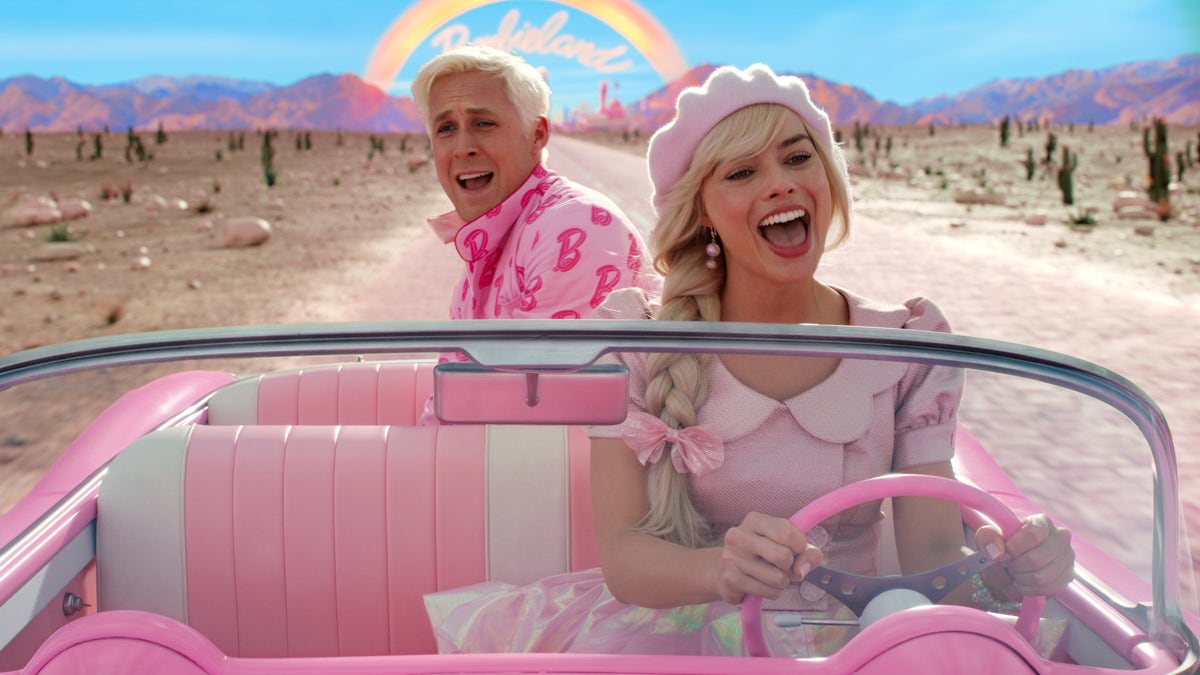Did the Barbie movie go too woke?
Tudor Dixon and Peachy Keenan analyze the new Barbie movie and the woke themes present in the film on ‘Jesse Watters Primetime.’
Within my close circles, I’m famous (or infamous) for obsessing about movies after seeing them. Unexpectedly, "Barbie" became one of those movies.
For many, it has inspired and irritated, entertained and enraged, and roused and rankled. Many laud its female empowerment message. Others decry how it portrays men as clueless, narcissistic and power hungry. Though left almost completely undefined, "patriarchy" is quite literally labeled a disease (like smallpox) that the Barbies of Barbieland fight to eradicate.
The din of praise and criticism might drown out the film’s deeper implications, which are perhaps unintended by the filmmakers. This summer’s popular movie has surprising implications regarding history’s most popular book.

Margot Robbie stars in "Barbie," which has inspired and irritated, entertained and enraged, and roused and rankled. (Warner Bros. Pictures)
"Barbie" and the Bible share a strange affinity – the culture’s love/hate affections. "Barbie" sparks nostalgia in those who cherish the beloved doll. Yet the film echoes contemporary criticism that Barbie contributes to body-image anxiety in young girls and perpetuates harmful female stereotypes. In fact, the film’s lead character is named "Stereotypical Barbie."
Though the Bible is the most beloved book of all time, contemporary culture’s relationship with it has morphed into the love/hate variety. The biblical message has inspired some of the greatest social reforms in history (women’s suffrage, the abolition of slavery, and the invention of the hospital, as but three examples). Yet, the Bible is now decried as the root of a poisonous patriarchy.
Through this strange communion, perhaps Stereotypical Barbie can shatter more than box office records. Perhaps she’ll help us shatter our perceptions about the Stereotypical Bible.
Consider the glaringly binary imagery and content of "Barbie." There is no mistaking that both Barbieland’s female utopia and the Real World’s dystopia are populated by distinct males and females who act in traditionally (and comically) masculine and feminine ways. Men love trucks, powerful animals, sports and "The Godfather." Women dress in pink, care about hygiene and are nurturing (of each other, not so much men).
The filmmakers inadvertently put an exclamation point on the binary statement in the movie’s last scene when Stereotypical Barbie – now a real woman – checks in for a gynecologist appointment. Perhaps the filmmakers didn’t intend for the glaring binary to emerge, given that Hari Neff, a transgender actor, portrays one of the Barbies. But emerge the binary does.
Interestingly, the Bible is denounced for describing the world with the same gender binary. Like the imagery in "Barbie," the Bible declares that humanity is made up of women and men, distinctly, without a sense of fluidity or continuum. Genesis 1:27, Genesis 5:2, Matthew 19:4 and Mark 10:6 declare that God made humanity in his image, specifically "male and female."
The very fact that "Barbie" is so widely applauded as a statement of women’s empowerment yet depicts distinctions between men and women provides at least some evidence that no matter how much we wrestle away from it, the same binary reality that the Bible has been declaring for centuries pulls us back in.
Perhaps more subtle, yet no less striking, is the parallel between Barbie and Ken on the one hand and Adam and Eve on the other. Ken dolls were created solely to be Barbie’s boyfriends. In the film, despite his efforts at self-definition through cartoonish machismo, Ken can’t escape the fact that he’s derivative of – and therefore inferior to – Barbie.
Eventually, Barbie urges Ken to find his sense of worth apart from her. But Ken’s angst persists. He only exists because of Barbie and was made for her. But Stereotypical Barbie eventually persuades (stereotypical) Ken.

Ryan Gosling's Ken accompanies Barbie to the real world in "Barbie." (Warner Bros. Pictures)
"Barbie" gets at least this quite right: the order and seeming purpose of men’s and women’s creations don’t dictate the degrees of their dignity and worth. This subtle gem in a not-so-subtle movie shatters the stereotype of Eve’s creation as a declaration of women’s inferiority to men.
BILL MAHER ROASTS ‘BARBIE’ MOVIE FOR BEING ‘PREACHY, MAN-HATING’ AND A ‘ZOMBIELIE’
The stereotype goes like this. Eve’s creation from Adam’s rib in Genesis 2:21–22 assaults us with the idea that Eve is a derivative of Adam and that God created her not as an equal partner for Adam but as something like his Stepford wife (she’s Adam’s Ken).
But Eve’s creation in Genesis 2 actually speaks to the equality the original couple was meant to have. Adam lovingly calls Eve "bone of my bones and flesh of my flesh" (v. 23).
The apostle Paul advocates humility for any man who sees in Eve’s creation anything that might justify male preeminence. "For as woman was made from man," he writes, "so man is now born of woman. And all things are from God" (1 Cor. 11:12).
Couple this with the fact that men and women each are created in God’s image (Gen. 1:27). Since no aspect of God’s image can be inferior to another, males and females bear God’s image equally. Further, Adam (men) and Eve (women) were created to have relationships with each other as an expression of their relationships with their Creator. Thus, the order of their creation has nothing to do with the quality of their value and purpose. Barbie might agree.
Yet Stereotypical Barbie deviates significantly from the Bible. My ethnic background as a Middle Easterner and my religious background as a convert to Christianity from Islam fuel my reflections. The Middle East isn’t known for being the bastion of women’s rights. Islam has been criticized for its views of women relative to men.
As I examined the life of Jesus as accounted for in the Bible, I saw something profoundly different about this Middle Eastern man. He bucked the misogyny of his time in ways that gave life to women and men alike.
Now, "Barbie" puts the degrading shoe on the male foot to make men uncomfortable, to show men how women feel when they see degrading female stereotypes paraded on screens and elsewhere. Fair enough, but it goes too far because, throughout the film, women’s value emerges at the expense of men’s dignity. Therein lies a contrast with Jesus.
In numerous instances, Jesus vaunted women to their places as equals to men. He championed their right to education. He used women as proxies for God in his famous parables. Women are heroines at his birth, part of his ministry, and faithful at his death. Indeed, they were granted the honor of being the first witnesses to Christianity’s pinnacle miracle – Jesus’ resurrection.
While he chastised men’s treatment of women, Jesus never belittled men. He shattered stereotypes that held women back without creating new stereotypes about men.
A friend told me that during a conversation with a prominent atheist thinker in the U.K., the atheist acknowledged that "Jesus was not a product of his time." As a Middle Easterner, I heartily agree. That’s why women fled other religions and flocked to the fledgling Christian movement in the early centuries. If "Barbie" offers us something of value, it is its contrast with Jesus’ way of dignifying women without denigrating anyone.
Here’s a final reflection. "Barbie" goes beyond male-female power struggles. "Barbie" is about what it means to be human and explores the messy real world where we forge our dignity and purpose through achievement, beauty and recognition.

Margot Robbie attends the "Barbie" European premiere at Cineworld Leicester Square on July 12, 2023, in London. (Samir Hussein/WireImage)
When Barbie encounters the ghost of her creator, Ruth Handler, she tells Barbie that humans create concepts like patriarchy and Barbie dolls to bring meaning to a messed up world. Barbie’s response is thought-provoking. She wants to be part of those who make meaning, not the meaning they make.
CLICK HERE FOR MORE FOX NEWS OPINION
Popular culture’s stereotypes loom large in that exchange. Each of us makes our meaning and forges our value by creating social structures and plastic idolizations of ourselves to deal with our shortcomings, only to be riddled with more angst because we fail to live up to the very idols we make. The Bible confounds that stereotype, warning of the harm that befalls us when we look to man-made idealized images instead of focusing on the image of God we each bear.
Since God’s image is infinitely beautiful and valuable, our reflection of his splendor defines our worth and meaning. For the Christian, the cross is a striking declaration that our value is so high that God paid an infinite price to redeem us. To be sure, "Barbie" is not a Christian film, but it can get us to think about far more than we might think.















































